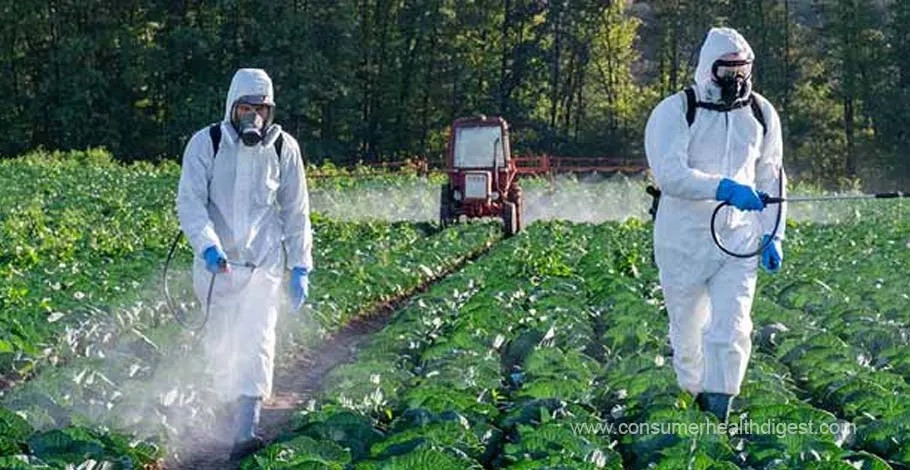In This Article
Overview
Every year, more than 1 billion pounds of herbicides are used throughout the United States to protect crops from unwanted weeds and grasses. [1] Over recent decades, paraquat, a highly toxic herbicide, has become increasingly popular in the country, as it can destroy plants that are resistant to glyphosate, another dangerous product sold under the brand name Roundup.

The use of paraquat has skyrocketed from 2011 to 2017. Accordingly, it went from 3 million kilograms in 2011 to 7 million kilograms in 2017. Since 1962, when it was first manufactured, paraquat has been applied to over 100 different crops, such as soybeans, cotton, peanuts, corn, and sunflower. It is important to note that exposure to paraquat, which occurs through inhalation and skin contact, is associated with a high risk of developing Parkinson’s disease later in life.
The likelihood of being diagnosed with this brain disorder is 250% higher in people who are regularly exposed to paraquat than that of the general population. Moreover, any exposure to paraquat within 1,600 feet of a home increases the risk of developing Parkinson’s disease by 75%. [3]
The majority of products that contain paraquat have a concentration of nearly 44% of this herbicide, which makes them very dangerous, as a single sip can instantly kill a person.
For this reason, people who want to use paraquat, most of whom are agricultural workers and farmers, must undergo mandatory training provided by the Environmental Protection Agency, during which they learn about the toxicity of paraquat, the new label requirements, and restrictions, as well as the consequences of misuse.[4]
The training became mandatory in 2016, as there had been too many cases of accidental poisoning with paraquat. While in the past, people could use paraquat under the supervision of a licensed applicator, this is no longer the case.
Furthermore, people who apply paraquat are required to always wear personal protective equipment when working with the product, but is this enough to shield them from exposure to this toxic herbicide?
The Case of Russell Denes and the Role of Personal Protective Equipment
In April of this year, Russell Denes, a certified applicator of paraquat, who had always worn the personal protective equipment required by law when using the herbicide, filed a lawsuit against Syngenta, one of the most renowned manufacturers of paraquat that sells this product under the brand name Gramoxone, as he developed Parkinson’s disease after 30 years of using paraquat.
For several years, he worked under the supervision of a licensed applicator of paraquat and subsequently obtained the certification himself from the Environmental Protection Agency. He had always worn personal protective equipment when applying the herbicide, which raises the question: is wearing personal protective equipment enough to shield you from the dire health consequences of paraquat exposure?
On the label of every product that contains paraquat, there is a list that explains what personal protective equipment entails for licensed applicators of this herbicide.
According to it, people who mix, load or apply paraquat must wear a long-sleeve shirt and long pants, shoes, and socks, a NIOSH-approved particulate respirator with any R, N, or P filter, chemical resistant gloves, a face shield, and a chemical-resistant apron.
However, since so many individuals have recently come to struggle with Parkinson’s disease as a result of having been exposed to paraquat, it seems that wearing this personal protective equipment is not sufficient, as exposure to the herbicide still occurs. The rate of Parkinson’s disease diagnosis increased by 107% from 2013 to 2017 in the United States, which may have a direct connection with the emerging use of paraquat throughout the country.
Because paraquat vapors can easily travel from the crops it was sprayed on to nearby areas, including the home of the user or neighbors, exposure will still occur, despite the individual wearing personal protective equipment when employing the herbicide. While one may argue that the inhalation of paraquat is not a dangerous route of exposure, this is far from the truth, as breathing in particles of paraquat is extremely dangerous.
The paraquat vapors you inhale will eventually reach the brain through the bloodstream, where they will slowly damage the portion of the brain known as substantia nigra, which is responsible for releasing dopamine, the neurotransmitter that plays a crucial role in how we experience pleasure, as well as in numerous other crucial functions of the nervous system.[5]
In people with Parkinson’s disease, this portion of the brain is always damaged, which means that paraquat exposure can be the culprit behind this diagnosis. Consequently, personal protective equipment is not enough of a safety measure to shield the user of this herbicide from exposure.
The State of Paraquat in the United States
While paraquat is currently banned in 32 countries due to the acute toxicity of the herbicide, it is approved for use in the United States by the Environmental Protection Agency, despite the fact that it is responsible for the death of at least 27 people, as well as for numerous diagnoses of Parkinson’s disease.[6]
Even China, which is notorious for not placing great emphasis on the wellbeing of its agricultural workers, has recently banned paraquat. It is noteworthy that paraquat has not been tested by the U.S. Department of Agriculture, yet it is approved for use on row crops.
The Biden administration will have to go to great lengths to reverse the damage done by the Trump administration with regard to the allowed herbicides that are currently used in the country. Because the endeavors of the Environmental Protection Agency to restrict the use of certain herbicides under the Obama administration were reversed by the Trump administration, the Biden administration will have to thoroughly review how these products are employed throughout the country, as well as whether there should be a complete ban of paraquat.
Biden talked about a decision of Trump that weakened farmworker protections from herbicides such as paraquat. Environmental and farmworker groups said they hope the Biden administration will live up to the promise stated in the executive order: “It is, therefore, the policy of my Administration to listen to the science; to improve public health and protect our environment; to ensure access to clean air and water; to limit exposure to dangerous chemicals and pesticides”.[7]
According to Lori Ann Burd, the environmental health program director at the Center for Biological Diversity, the Trump administration was “15% worse” with regard to herbicide regulation than the former administration.
Kristin Schafer, executive director of the nonprofit Pesticide Action Network, said if the Biden administration is going to “listen to science”, it will reconsider numerous of the approvals of dangerous pesticides by the Environmental Protection Agency. “If they lift up the science, we’re hopeful for where that will lead”, she said.
In October of 2020, the Environmental Protection Agency proposed a series of safety measures with respect to the use of paraquat, including prohibiting aerial application for all uses except cotton desiccation, requiring enclosed cabs if the area treated in a 24-hour period is more than 80 acres and adding mandatory spray drift management label language.[2]
Moreover, the agency is proposing to allow truck drivers who have not certified applicators of paraquat to transport it only when certain requirements are met.
After the release of the Proposed Interim Decision that proposes new mitigation measures to reduce potential ecological risks and protect public health from paraquat use, the Environmental Protection Agency had been seeking public input until December 22, 2020.
However, there were no further announcements made by the agency after they stated that they are seeking public input, which means that the new safety measures proposed by the Environmental Protection Agency concerning paraquat have not come into effect yet.
Recovering Financial Compensation for Parkinson’s Disease Caused by Paraquat Exposure
In the regrettable case that you have a family member that developed Parkinson’s disease as a consequence of paraquat exposure, whether they used the herbicide themselves or were exposed by living in close proximity to a farming community, you may recover financial compensation on their behalf with the assistance of a specialized attorney.
The first paraquat lawsuit was filed in 2017 in Missouri against Syngenta and Growmark, two of the most famous manufacturers of this herbicide. This opened the door for hundreds of other injured people to seek compensation from the liable companies. In the near future, there may be a class action multidistrict litigation lawsuit filed against multiple manufacturers of paraquat by people who were diagnosed with Parkinson’s disease as a result of exposure to this dangerous herbicide.
Those diagnosed with Parkinson’s Disease who may have also been exposed to paraquat should consult an attorney who specializes in toxic tort claims. They can evaluate the case and file claims or a lawsuit against the manufacturers of paraquat.
The current estimation is that those claims are likely to be fairly valuable. It is essential for a close family member to get involved in the legal process, as people who struggle with Parkinson’s Disease often have difficulties in clearly explaining their situation to the legal team.
The money you may recover by filing a claim against the responsible paraquat manufacturers can help your family member afford better healthcare and treatment, which may improve their quality of life, as the average cost per year on individual care for a person with Parkinson’s disease is $26,400.
Conclusion
Paraquat is a very toxic herbicide that should ideally be banned in the United States, as exposure to it can lead to the development of Parkinson’s Disease later in life. Those exposed to paraquat who have subsequently been diagnosed with Parkinson’s Disease may file a potentially valuable claim with the help of a specialized attorney.
Jonathan Sharp is the CFO and Director of Claims at Environmental Litigation Group, P.C. The law firm, which is located in Birmingham, Alabama, specializes in toxic exposure and has been helping people recover financial compensation since 1990. The main responsibilities of Jonathan Sharp include case evaluation, management of firm assets, and financial analysis.
Was this article helpful?
6 Sources
We review published medical research in respected scientific journals to arrive at our conclusions about a product or health topic. This ensures the highest standard of scientific accuracy.
[2] Parkinson’s disease : https://pubmed.ncbi.nlm.nih.gov/30584159/
[3] Environmental Protection Agency : https://www.epa.gov/pesticide-worker-safety/paraquat-dichloride-training-certified-applicators
[4] Dopamine and Parkinson's Disease : https://www.ncbi.nlm.nih.gov/books/NBK6271/
[5] State of Paraquat : https://www.epa.gov/pesticide-worker-safety/paraquat-dichloride-one-sip-can-kill
[6] State of Paraquat : https://www.epa.gov/pesticides/epa-proposes-new-safety-measures-paraquat








 This article changed my life!
This article changed my life! This article was informative.
This article was informative. I have a medical question.
I have a medical question.
 This article contains incorrect information.
This article contains incorrect information. This article doesn’t have the information I’m looking for.
This article doesn’t have the information I’m looking for.